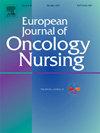心理和生物压力途径是癌症患者心理-神经症状群的共同机制:感知压力、皮质醇和促肾上腺皮质激素。
IF 2.7
3区 医学
Q1 NURSING
引用次数: 0
摘要
目的:本研究旨在探讨(a)心理压力是否与多种精神神经症状(抑郁、认知障碍、疲劳、睡眠障碍和疼痛)集群体验相关;(b)应激激素(促肾上腺皮质激素[ACTH]和皮质醇)是否与心理压力和症状集群体验相关:这项横断面研究分析了133名等待化疗的血液肿瘤患者的数据。酶联免疫吸附试验分析了早晨的应激激素水平(促肾上腺皮质激素和皮质醇)。潜伏特征分析确定了出现精神神经症状群的群体。影响精神神经症状群的因素被列为协变量,并使用多项式逻辑回归进行分析:结果:33%(n = 44)的人经历了全部五种精神神经症状群,并且每种症状的严重程度都高于未经历症状群的人(ps 结论:心理压力而非生物应激反应是影响精神神经症状群的主要因素:出现精神神经症状群的原因是心理压力,而不是生物压力反应。控制压力水平有助于缓解这种症状群。本文章由计算机程序翻译,如有差异,请以英文原文为准。
Psychological and biological stress pathways as common mechanisms underlying a psycho-neurological symptom cluster in cancer patients: Perceived stress, cortisol, and ACTH
Purpose
This study aimed to examine (a) whether psychological stress is associated with experiencing multiple psycho-neurological symptoms (depression, cognitive impairment, fatigue, sleep disturbance, and pain) as a cluster and (b) whether stress hormones (adrenocorticotropic hormone [ACTH] and cortisol) are associated with psychological stress and symptom cluster experience.
Methods
This cross-sectional study analyzed data from 133 patients with hematologic cancer awaiting chemotherapy. Enzyme-linked immunosorbent assays analyzed the morning stress hormone levels (ACTH and cortisol). Latent profile analyses identified the group experiencing a psycho-neurological symptom cluster. Factors influencing the experience of the psycho-neurological symptom cluster were included as covariates and analyzed using multinomial logistic regression.
Results
Thirty-three percent (n = 44) experienced all five psycho-neurological symptoms as a cluster and experienced each symptom in a higher severity than those who did not experience the symptom cluster (ps < 0.05). Thereby, this group legitimately experienced the psycho-neurological symptom cluster. The major determinant of this group was the perceived psychological stress (OR = 8.05, 95% CI = 3.08; 20.99). Further, each symptom demonstrated a positive association with stress levels (correlation r ranged from 0.22 to 0. 56, all ps < 0.05). Participants with higher stress were more likely to experience the symptom cluster. Stress hormones levels (ACTH and cortisol) were neither associated with the symptom cluster experience nor with psychological stress levels.
Conclusions
Psychological stress, rather than biological stress response, is involved in experiencing the psycho-neurological symptom cluster. Managing stress levels would help alleviate this symptom cluster.
求助全文
通过发布文献求助,成功后即可免费获取论文全文。
去求助
来源期刊
CiteScore
4.40
自引率
3.60%
发文量
109
审稿时长
57 days
期刊介绍:
The European Journal of Oncology Nursing is an international journal which publishes research of direct relevance to patient care, nurse education, management and policy development. EJON is proud to be the official journal of the European Oncology Nursing Society.
The journal publishes the following types of papers:
• Original research articles
• Review articles

 求助内容:
求助内容: 应助结果提醒方式:
应助结果提醒方式:


